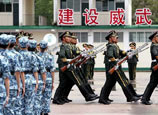
BEIJING, July 20 (Xinhuanet) -- Now that the Shanghai free trade zone has got the State Council's approval, people have begun to wonder what Shanghai would be like without it. The short answer is all those big plans for becoming an international financial center and a global trading hub will remain, well, big plans for many years to come.
The free trade zone would provide the conditions for Shanghai to make a real breakthrough from its present mode of development. Without it, the city is constrained from realizing its ambitious dream because of the national economic and financial structure, regulatory environment, bureaucratic inertia and entrenched political and business interests.
Of course, China is fast changing. But it will likely take decades before the system is loosened up enough for Shanghai to take flight. As it is, Shanghai must be content to play host to the largely domestic capital market. With the newly developed deep-water port, Shanghai is well established as a major sea port servicing its vast Yangtze River Delta hinterland.
To be sure, the domestic business is large enough to facilitate the restructuring from manufacturing to a high-value-added, service-oriented economy. The services sector now accounts for more than 60 percent of the city's economy and provides the main impetus for its growth. But Shanghai is far from being an international city, although it is the location of choice for China or regional headquarters of an increasing number of foreign companies.
Unlike Hong Kong or Singapore, Shanghai is not equipped to handle offshore trade and financial transactions. Thanks, at least partly, to its low tax regime, Hong Kong is a well-established loan syndication center servicing the funding needs of governments and corporations in the region and around the world. It also shares with Singapore the region's fund management and private banking businesses.

















 Elder couples celebrate golden wedding anniversary in Hangzhou
Elder couples celebrate golden wedding anniversary in Hangzhou


![]()
